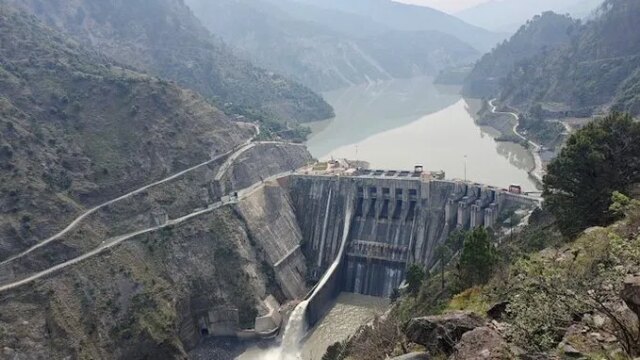Srinagar, Oct 27: The ambitious 1856 MW Sawalkote Hydro Electric Project on the Chenab River, billed as the largest hydropower venture in Jammu and Kashmir, remains entangled in procedural, technical, and financial hurdles, seven years after it received techno-economic clearance from the Central Electricity Authority (CEA).
In a detailed written reply to a question raised by NC MLA from Banihal, Sajad Shaheen, in the Legislative Assembly, Chief Minister Omar Abdullah, who also holds the portfolio of the power ministry, said that despite substantial pre-construction progress and the formal transfer of the project to NHPC Limited for execution, “the final approval and financial closure are still pending.”
The reply attributed the delay to engineering challenges, prolonged regulatory clearances, and an ongoing review of the project’s cost and financial viability, estimated at Rs 20,136 crore at 2016 price levels.
The minister informed the House that the project, initially conceived and developed by the Jammu and Kashmir State Power Development Corporation (JKSPDC), received a Techno-Economic Appraisal from the CEA on April 18, 2018.
“As per the initial schedule, the project was to be completed within 96 months from the zero date, with May 31, 2026, set as the reference point, excluding a 24-month pre-construction phase. However, the project timeline has been derailed due to multiple factors,” he said.
The minister said that in 2021, the J&K government signed a Memorandum of Understanding (MoU) with NHPC Limited, transferring the project under a Build, Own, Operate, and Transfer (BOOT) model.
Under this arrangement, NHPC will own and operate the project for 40 years after commissioning, after which ownership will revert to the JKSPDC.
“NHPC is presently conducting a comprehensive financial and technical viability review, in consultation with the CEA, before the final Detailed Project Report (DPR) is updated and approved for construction,” the minister said.
Before its transfer, the JKSPDC had completed several crucial pre-construction components that laid the groundwork for future construction in the rugged Chenab basin.
These include the construction of a 1500-metre-long access tunnel to the dam site, a 178-metre steel bridge across the Chenab River to facilitate material movement, and 18.5 km of approach roads connecting both banks.
The minister said that these works were vital for ensuring logistical access in the challenging terrain spanning Ramban, Reasi, and Udhampur districts.
Land acquisition remains one of the project’s most complex challenges. The total land acquisition award is valued at Rs 313 crore, of which Rs 40.41 crore has been released to affected families so far, while Rs 272.59 crore is still pending disbursement. The reply acknowledged that delays in compensation payments had slowed full-scale land takeover but assured that rehabilitation and resettlement plans were being implemented with priority given to the affected families.
The plans include compensation packages and employment opportunities for locals in various phases of project execution. The minister also pointed to several reasons behind the project’s continued delay, including lengthy approval processes from key central agencies like the CEA, Central Water Commission (CWC), Geological Survey of India (GSI), and the Ministry of Environment, Forest and Climate Change (MoEFCC).
The difficult mountainous terrain, seismic vulnerability, and environmental concerns related to the submergence of agricultural land and the displacement of communities have further compounded the challenges.
The minister said that the NHPC was still finalising its cost-benefit framework and assessing financial feasibility before seeking formal investment sanction.
Once the financial and technical viability is confirmed and the DPR updated, the project will move into its full-fledged construction phase.
The government expects this process to take several more months, with additional groundwork and mobilisation likely to follow before any major on-site activity begins. The minister said that when completed, the Sawalkote Hydro Electric Project is expected to transform J&K’s power sector. It would add 1856 MW of generation capacity to the grid and create nearly 6500 direct and indirect jobs during peak construction. The project, which will be among the largest in north India, is expected to reduce J&K’s reliance on electricity imports, especially during winter months, and enhance energy security across J&K.








